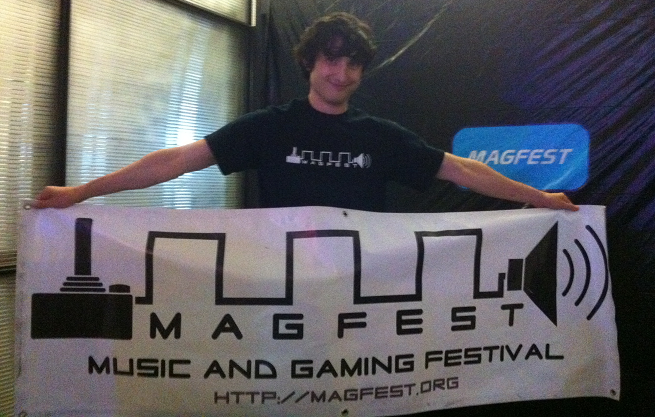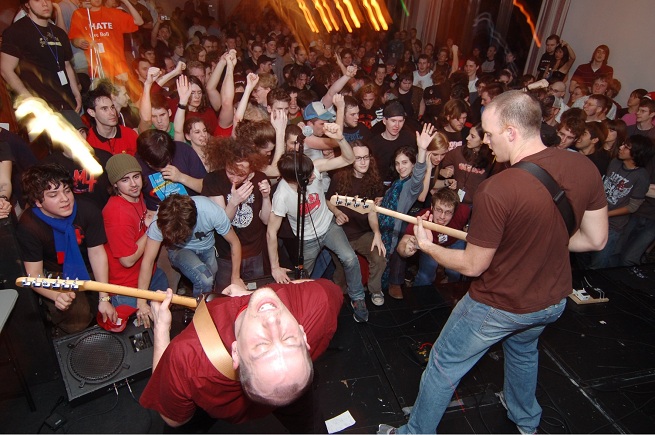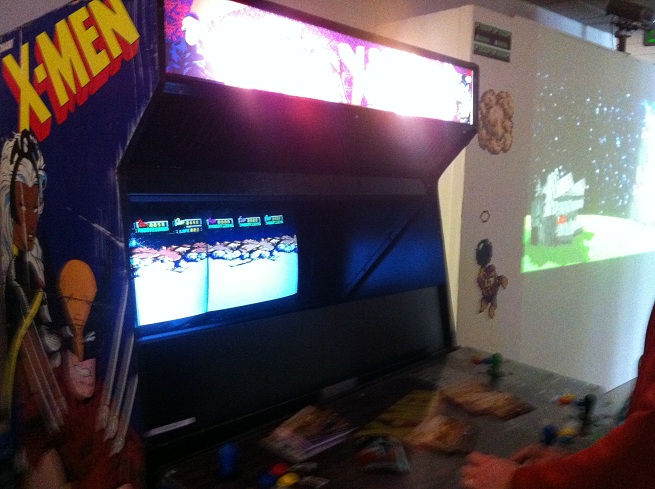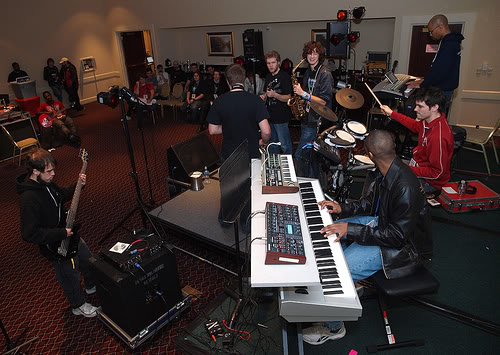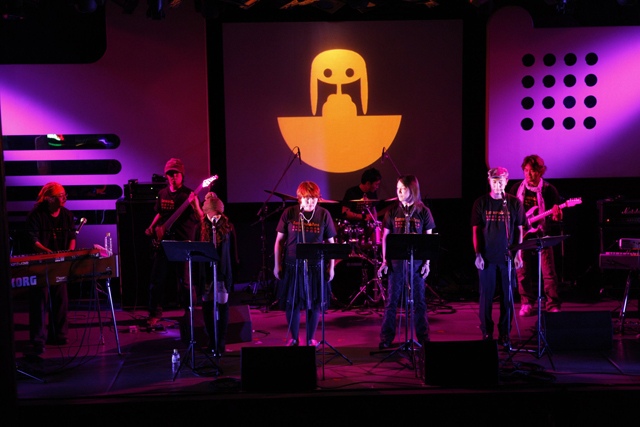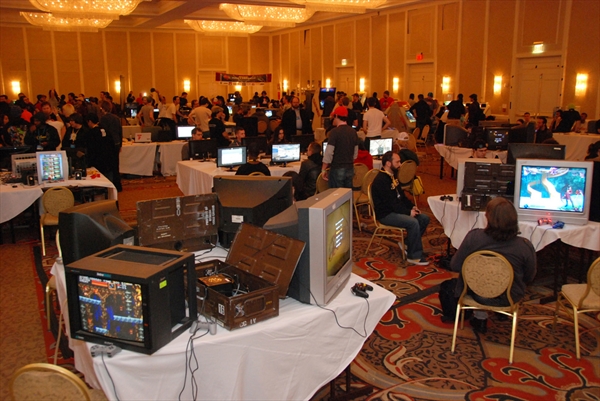The first thing I notice about Nick Marinelli (pictured above) as I shake his hand are the grey strands of hair developing in the messy, curly mop on his head. They’re usually the beginning indicator of stress-induced exhaustion, like the physical transformation a U.S. president undergoes in his first term.
But for Marinelli, affectionately adorned with “the newbie” title, they betray the incredible amount of energy he displays. As the director of press and public relations for Maryland-based MAGFest, the Music and Gaming Festival, he runs me through how this celebration of gaming culture is counter to all my expectations.
The fast-talking Marinelli enthusiastically shakes back, asking whether I’ve heard of MAGFest. I say no, which seems a little crazy in retrospect. MAGFest is now in its 11th year. I’ve lived in Maryland since 1999. How have I not heard of this before?
As we sit down together at Baltimore’s Gamescape, Marinelli asks the first question. “Would you like a Yuengling or a Natty Boh?” I take the Boh, of course, which is shorthand for National Bohemian, the beer of the city. This set the tone for our interview that afternoon, and offered a glimpse into what MAGFest is all about.
GamesBeat: What is MAGFest? I’ve lived in Maryland for 13 years, and I’ve somehow never heard of it. I imagine that most out-of-state readers will be scratching their heads.
Nick Marinelli: You know about Electronic Entertainment Expo. You know about Tokyo Game Summit. Consumer Electronics Show. They’re really cool events. You get to see all the newest stuff coming out. You get to see never before seen previews and that kind of thing. But they’re these giant media frenzies — just total press blitzes where you wait in line three hours to get 15 minutes to try out this new game. It’s crowded, it’s busy, and it’s just a marketing frenzy.
MAGFest was started in 2002 because there was no real large-scale event where instead of going and seeing whatever the latest thing was, people could just get together and play games with each other.
Forget all the new stuff that’s coming out. Think about what’s out now. Think what you enjoy. What you like playing. Maybe what just came out that’s starting to get popular. It’s for people to get together and just party, basically.
GamesBeat: That’s a refreshing change of pace as far as these things go. But how does music fit in?
Marinelli: At the same time [when MAGFest began], the video game music cover scene was really starting to pick up. And bands like the Minibosses, the NESkimos, [and] The OneUps were starting to get popular. And although they would play one-off shows, there was no place to come and see a bunch of video game cover bands.
Joe Yamine actually started the first one, and he wanted people to just come together, play games, and rock out to some great video game cover bands and drink heavily. After the first one, he — I think he just wanted to see if he could do it — he didn’t really want to do it anymore.
Brendan Becker, who loved it, didn’t want to see it go away. So he bought it from [Yamine]. And then he kind of built up an army over the next eight or so years to bring MAGFest from 250 up to 3,000 [attendees] at MAGFest 9. We sold out MAGFest 9. It was 6,000 the following year when we moved venues.
We grow slowly but somewhat predictably thanks to the fact that we’re not banking on having a big-name exhibitor to come and show something that nobody’s seen before. People come because they have friends there [and] they want to bring more friends there. They want to party, play games, and rock for the weekend with their friends, and they want to meet more friends. It’s not about seeing something no one’s ever seen more; it’s about getting together and celebrating what you love.
GamesBeat: What kind of stuff do you normally have on display since MAGFest is a celebration of existing culture?
Marinelli: When it comes to gaming, we try to run the gamut of every type of typical gaming: For consoles, we try to get from the Atari all the way up to the PlayStation 3.
GamesBeat: Impressive.
Marinelli: We’re not necessarily a for-children event, but we have something that people of all ages can enjoy. ‘Cause people — kids like their Naruto these days, so they can play that, but we also have the ColecoVision if anyone wants to play that.
Brendan [Becker] actually tries to do a museum every year because he has a bunch of weird, esoteric systems that no one’s ever seen before — maybe you’ve heard of but never seen, like the CD-i or the 3DO or things like that. Japanese stuff like the MSX or the X68000. So, for consoles, we basically have more or less every console you could imagine — at least domestically.
We have a network of arcade [cabinet] collectors who bring their collections. Just like how people bring their friends together to help MAGFest grow, arcade collectors tell other arcade collectors just how great MAGFest is.
We help them rent a truck, and they just build it [and] bring it in. We had 150 arcade machines last year all on free play. That X-Men machine there is ours [editor’s note: Marinelli points to a bulky X-Men: The Arcade Game cabinet sitting to our right, which features dual screens and has support for six simultaneous players. Pictured above]; we have another guy who has another six-player X-Men machine. That’s actually become a meme within MAGFest — “The Colossus.”
We have a PC area, a bring-your-own-computer land. We have tabletop games, which includes board games, card games, pen-and-paper role-playing games, [and] collectible card games.
GamesBeat: What about music? You mentioned a few bands — what else do you have?
Marinelli: Our main focus on concerts is video game music cover bands. And that’s what occupies the main stage for three nights — we’re actually a four-day event. We start with Thursday, and we go ‘til Sunday.
Up until [MAGFest] 7, we were a three-day [event], but people just started showing up earlier because we’ve become like a nexus for different gaming communities online. They want to have some place to do their meet-up. They’re maybe not big enough to have an event on their own, so they just all have their meet ups at MAGFest. People just kept showing up earlier and earlier because they just wanted to hang out with their friends more. So we said, “OK, let’s just give them content.”
So we have our main stage concerts on Thursday, Friday, and Saturday nights, and that’s video game music cover bands. During the day, we do chiptune concerts — are you familiar with chiptunes at all?
GamesBeat: Yes.
Marinelli: We have DJs and more chiptunes after the main stage concerts later at night, like past midnight. And recently, we’ve also added a second stage for anybody that we can’t squeeze into the main stage show.
We also have Jamspace, which is something somewhat unique to MAGFest, but we try to bring it to other events as well where it’s provided instruments, drums, bass, guitar, [and] keyboard. People can bring their own stuff, too. And since so many musicians come to MAGFest and it’s such a heavy focus on video game music — it’s almost like a folk music kind of thing. Everyone knows what it is. Everyone knows how to play it. People just get together and jam with each other.
GamesBeat: Have you ever spotted someone famous rocking out at Jamspace?
Marinelli: Sid Meier [editor’s note: creator of the PC strategy series Civilization] came a few years back. He went to the Jamspace and played, he called it, “Hotel Civilization.” He got on the piano and started playing “Hotel California” with Civilization lyrics. And Jon St. John [editor’s note: famous for voicing Duke Nukem] made a song called “Balls of Steel.” [Singing] Baby I’m gonna explode unless I shoot my load with these balls of steel.
GamesBeat: Has MAGFest ever had any big acts headline the festival?
Marinelli: Our biggest act, undoubtedly ever, was last year: Nobuo Uematsu. He’s the primary composer for the Final Fantasy series. He had a band called The Black Mages, which was extremely popular, but they ended up splitting up because of contractual things with Squaresoft [editor’s note: now Square Enix]. He formed a new band with a couple of new guys and some of The Black Mages, and they’re called Earthbound Papas.
GamesBeat: Earthbound, huh?
Marinelli: No relation to the game Earthbound. They played last year. And I believe we got in that concert hall alone — there were about 2,500 people in there. And that was the largest concert that venue has ever had before.
The Protomen are pretty popular. We’ve had them before. The OneUps and the Minibosses are two pretty well-known names — at least in the video game music scene.
Video game music is very much of a niche, and that’s like the entirety of MAGFest. It’s weird how we’ve grown because you have one person who’s really passionate about something and wants to bring that to MAGFest. And we’ll say, “All right, sure, we’ll give you a shot. Maybe see what you can do with that.”
We’ve just kind of grown piecemeal as the years have gone on. The concerts have gotten better independently. We’re almost like eight different events all going on at the same time at the same place ‘cause we just get a network of people who are really passionate about something and come together under one roof or management structure — I don’t know if you want to call it “management” because we’re really shitty managers.
GamesBeat: But you must be at least good enough to put together this “challenges” thing I see at your table here. What are challenges all about?
Marinelli: Challenges started at MAGFest 6. Again, the piecemeal thing, a guy had an idea, so why not? Let’s do it.
They’re save points in classics games for Nintendo Entertainment System, Super Nintendo, and Sega Genesis that put you in unusually difficult positions with very odd circumstances to see if you can beat that point in the game. Stuff like: Beat this boss, you can’t get hit, you don’t have this item that you should, [or] you’re not allowed to use some button you’d normally be able to use. And they range in difficulty from normal up to unfair.
We’ve been doing this for about four years now, and we try to introduce new challenges every year. When people come to MAGFest, they can play the challenges, and they win prizes and stuff as they beat them. Top competitors of the weekend get gift certificates, MAGFest passes — stuff like that. What we do is what we call “M Points,” these little laser-etched tokens that you can take to any of our vendors or our marketplace and spend them to buy any goods that anybody is selling.
For all of our tournaments, we try to give out M Points as prizes. A lot of places have you pay cash to enter a tournament. You win some big cash prize or some bullshit like that at the end.
GamesBeat: With things like StarCraft e-sports and fighting game competitions, it’s serious business. But based on what I’m hearing now, MAGFest strikes me as something different.
Marinelli: We are decidedly against rough and vicious competition. Big tournaments attract assholes, and if you’re not an asshole already, you’re on your way to become one the more you try. Just like when you’re here to have fun and party, it’s the same thing with the tournaments. Casual competition, have fun, [and] give your best. If you lose, no big deal. If you win, you get some gift certificates.
We try to stick to our guns on that because a lot of people ask us to host tournaments, but we really want to keep it grassroots, the way it is now: community, relaxed, [and] no pressure. Because stuff like The Evolution Championship Series — this stuff is huge! These people are serious, and unless you’ve been playing this stuff all your life, you’re not going to stand a chance against them.
GamesBeat: Do you do anything specifically to keep the tone casual?
Marinelli: Yeah. It’s been hard after 11 years, but we think that the reason that we’ve been going as long as we have is because we’re able to stick to our principles. In the face of all these opportunities to just kind of cash in and, say, get a sponsored tournament and 2,000 people who are there because of a match invitation or something like that. We’re of the opinion that if you’re just coming to MAGFest to see one thing, you probably shouldn’t come to MAGFest because you’re probably not going to enjoy it as much as you should.
We are inherently — because of how we’re organized — less pretty than a lot of other events. We throw it together on a shoestring budget. None of us get paid at all in any way, shape, or form — well, we possibly get to take home X-Men machines! We’re just kind of doing this in our spare time.
So that’s the kind of philosophy that applies across the entire thing: Be there to have a good time.
GamesBeat: Cosplay always seems to make an appearance at anything even remotely games related. Do you see a lot of cosplayers at MAGFest?
Marinelli: People often have wondered about our cosplay situation. People always ask, “Are you going to have cosplay competitions?” or something like that. Every anime convention that you go to, they have serious judges [and] craftsman quality costumes. Our most popular cosplay group comes every year [and] spends about a half hour in their hotel room with pizza boxes, duct tape, and sharpies.
GamesBeat: So, you have a big cosplay scene that comes to MAGFest?
Marinelli: It’s a decidedly different cosplay scene. We get cosplay people, but we tell them, “If you’re going to do this, you’ve got to have a sense of humor about it.”
We welcome all cosplay types, but the thing is: If you’re going to come in here with a $2,000 dress, you’ve got to have some kind of sense of humor over the fact that you’re a grown man dressing as a video game character. If you’re demanding to be treated like a diva because of all this work you’ve put in — it’s a video game for Christ’s sake. You had fun playing it, you should have had fun making it, [and] you should have fun wearing it.
So, our costume contest is more of a costume roast. We just kind of make fun of everyone who comes in and make them battle it out. I really liked the way that our costume contest ended up last year. We recruited some guys from Baltimore Rock Opera Society to MC the entire thing. And they had fun with it, so I loved that. A lot of cheering. A lot of hootin’ and hollerin’. Not come in, turn, bow, do a dramatic sketch with Coldplay playing in the background.
You learn to realize that you really shouldn’t take this stuff too seriously. It’s just all about having fun.
GamesBeat: Right. So every part of MAGFest is about keeping it casual, keeping it fun, and everyone having a good time.
Marinelli: Exactly. Even our panels.
GamesBeat: Panels?
Marinelli: We do have some intellectual game design panels. It runs the gamut of voice actors creating sketches with each other to serious stuff, like intellectual stuff, to “what is the best movie ever made, and why is it Die Hard?”
I’m not even kidding. We talked for an hour about why Die Hard is awesome. And 500 people were at that panel. And everyone was just having an honest discussion about why the movie is amazing. I didn’t think that it would work, but it did. And I loved it.
GamesBeat: Have any big-name game designers come to MAGFest to host panels?
Marinelli: Probably our biggest was Sid Meier. But it’s kind of the same vibe of everything else where we welcome big game designers to come, but the name is not what’s important. It’s the ideas and the philosophy and the passion behind it. I don’t care if you’re Cliffy B [editor’s note: Bleszinski, lead designer on Epic Games’ Gears of War series], if you’re not going to have some fun with it and some discussion that’s more than just blowing smoke up your own ass, it’s really not going to add much to our event.
So we get a few indie guys coming in, like this guy name Chris Hazard, who released a game called Achron. It didn’t get rave reviews, but the concept was amazing, and he had fantastic game design philosophies. So it was cool just seeing that guy talk for an hour.
A couple of our volunteers work for — we’ve got friends in Firaxis and Bethesda and all that. So people will drop by and say things. It’s not important who’s saying it but rather what’s being said.
GamesBeat: So the whole spirit seems to be staying focused on ideas, not celebrity.
Marinelli: Yeah. And the great thing is that even when we do get celebrities — we pick and choose our guests and celebrities such that if they come, they’re the type of people who aren’t there to just show up, sign autographs, and then hide in their hotel rooms. They’re people who are at MAGFest because they want to be at MAGFest. They want to have fun. They want to have parties.
Jon St. John — he’s the guy who comes year after year. People love him. And he loves people. MAGFest 8 and 9 — I think he had to pull it back a little for 10; he’s getting kind of old — he literally went door to door in the hotel looking for room parties. He was going in, crashing them, and taking shots and taking pictures with people. I think he got 30 room parties at MAGFest 9.
And this is how our guests work. They come, and they’re there to be with the attendees.
Extra Credits, who do a web series on game design philosophy, they did their panel, and they ran out of time, so we moved them to another room because people wanted to still talk. They talked for another hour because they’re there to interact, not to appear.
GamesBeat: Then, it wouldn’t be inaccurate to describe MAGFest as the people’s convention?
Marinelli: We don’t like to call it a convention. Or, at least, I don’t like to call it a convention. Because conventions suck! We’re a festival. Music and gaming festival. Because we’re not about just coming and standing in line for panels and then getting an autograph. We’re about coming together and partying with every other attendee there and every other guest there.
MAGFest 11 will be held at the Gaylord National Hotel and Convention Center in National Harbor, Maryland on January 3 through 6, 2013.
VentureBeat's mission is to be a digital town square for technical decision-makers to gain knowledge about transformative enterprise technology and transact. Learn More
